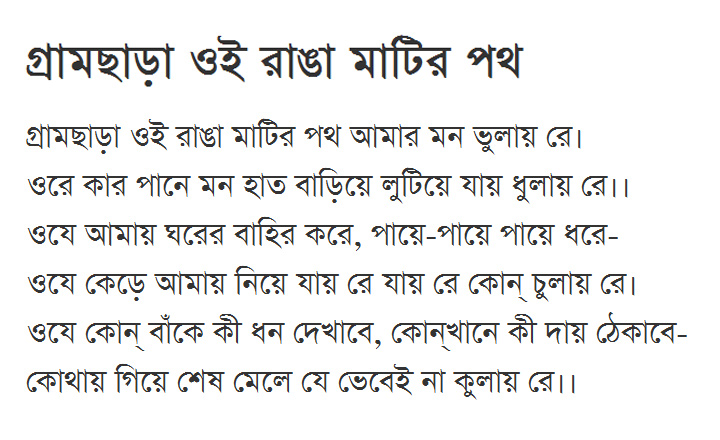
Desh-premik & swadhinatar gaan II
Last updated: 5 October 2017 From the section 1971 Muktijuddho
'Gram Chara oi Rangamatir Path' by Rabindranath Tagore
"Gram Chara oi Rangamatir Path" by Rabindranath Tagore
'Purbo Digante Shurjo Utheche' by Samar Das
"Purbo Digante Shurjo Utheche" by Samar Das
'Mora Ekti Phulke Bachabo Bole Juddho Kori' by Apel Mahmood
"Mora Ekti Phulke Bachabo Bole Juddho Kori" by Apel Mahmood
'Maago Bhabna Keno' by Hemanta Mukherjee
"Maago Bhabna Keno" by Hemanta Mukherjee
Artists behind the magic
Lyricist
Lyrics are the tangible reflection of moods and emotions. And when lyricist such as Gobindo Haldar and Gazi Mazharul Anwar put pen to paper, the passionate fire within the Bengalis reached fever pitch.
 Gobindo Haldar ()
Gobindo Haldar () 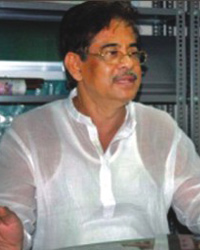 Gazi Mazharul Anwar () One of the most prolific lyricists in Bangladesh. Entered film industry in the '60s, and penned over 21,000 songs - possibly the highest number of songs written by an individual in the Asian subcontinent. Countless hit songs include Joy Bangla Banglar Joi, Ekbaar Jetey De Na Amar, Akasher Hatey Achey Ekraash Neel, Achen Amaar Mokhtar Achen Amaar Barrister, Mago Ma Ogo Ma, Tumi Ar Ekbaar Ashiya Jao Morey Kandaiya and many more. Winner of many highly prestigious awards including Swadhinata Padak and numerous National Film Awards.
Gazi Mazharul Anwar () One of the most prolific lyricists in Bangladesh. Entered film industry in the '60s, and penned over 21,000 songs - possibly the highest number of songs written by an individual in the Asian subcontinent. Countless hit songs include Joy Bangla Banglar Joi, Ekbaar Jetey De Na Amar, Akasher Hatey Achey Ekraash Neel, Achen Amaar Mokhtar Achen Amaar Barrister, Mago Ma Ogo Ma, Tumi Ar Ekbaar Ashiya Jao Morey Kandaiya and many more. Winner of many highly prestigious awards including Swadhinata Padak and numerous National Film Awards.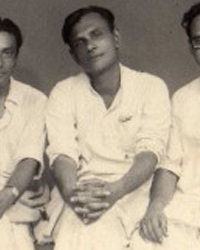 Gauriproshonno Mojumdar ()
Gauriproshonno Mojumdar ()  Nayeem Gohor ()
Nayeem Gohor ()  Mostafizur Rahman ()
Mostafizur Rahman ()  Fazle Huda ()
Fazle Huda () 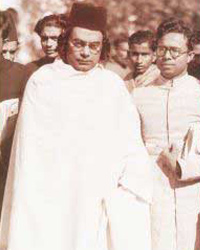 Kazi Nazrul Islam ()
Kazi Nazrul Islam ()
In our country the lyricists become a forgotten chapter when a song becomes a classic.
Gazi Mazharul Anwar , eminent lyricist who penned 'Joi Bangla Banglar Joi' on the sad plight of the song writers
Composers & singers
Composers like Anwar Parvez, Ansuman Roy, and Sujeya Syam created the haunting melodies whilst singers like Ajit Roy, Arup Chowdhury, Kaderi Kibria, Kalyani Ghosh, M. A. Mannan, Manna Haque, Nawsher, Probal Chowdhury, Rafiqul Alam, Rathin Roy, and Swapna Roy bought the songs to life. There were also multitalented people like Samar Das, Apel Mahmood, and Mohammad Abdul Jabbar who were both composers and singers. They inspired people with their revolutionary songs.
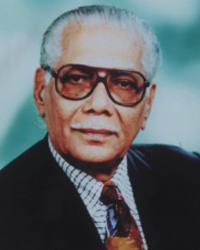 Samar Das (1929 - 2001) Composer of several patriotic songs that became immensely popular. These include Purbo Digontey Shurjo Uthechhey, Bhebo Na Go Ma Tomar Chhelera and Nongar tolo tolo shomoy je holo holo. Composed signature tune of newly founded Bangladesh Betar after Independence. Transcribed Rabindranath Tagore’s Amar Shonar Bangla (national anthem of Bangladesh) into Western notation for orchestration, as is common for national anthems. Composed music for over 50 Bengali and Urdu films in India, Pakistan and Bangladesh such as Aasia, and Nabarun. Music director of the first Bengali film — Mukh O Mukhosh — made in Pakistan in the late 1950s. Composed haunting melodies for one of the first films made in independent Bangladesh, Dhirey Bahey Meghna. Estimated that composed music for over 2,000 songs aired on radio and television. Awarded Ekushey Padak and Swadhinata Padak. Died on 25 September 2001 and was buried at the Christian cemetery in Wari, Dhaka.
Samar Das (1929 - 2001) Composer of several patriotic songs that became immensely popular. These include Purbo Digontey Shurjo Uthechhey, Bhebo Na Go Ma Tomar Chhelera and Nongar tolo tolo shomoy je holo holo. Composed signature tune of newly founded Bangladesh Betar after Independence. Transcribed Rabindranath Tagore’s Amar Shonar Bangla (national anthem of Bangladesh) into Western notation for orchestration, as is common for national anthems. Composed music for over 50 Bengali and Urdu films in India, Pakistan and Bangladesh such as Aasia, and Nabarun. Music director of the first Bengali film — Mukh O Mukhosh — made in Pakistan in the late 1950s. Composed haunting melodies for one of the first films made in independent Bangladesh, Dhirey Bahey Meghna. Estimated that composed music for over 2,000 songs aired on radio and television. Awarded Ekushey Padak and Swadhinata Padak. Died on 25 September 2001 and was buried at the Christian cemetery in Wari, Dhaka.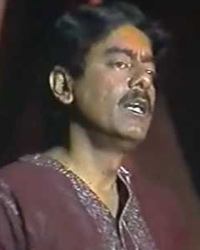 Apel Mahmood ()
Apel Mahmood () 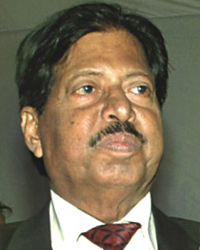 (Mohammad) Abdul Jabbar () Sang the first song of SBBK, "Joi Bangla Banglar Joi", written and composed by Gazi Mazharul Anwar and Anwar Parvez respectively. The other patriotic songs rendered and composed by Jabbar during the pre- and post-Liberation period were "Salam salam hajar salam", "Mujib baiya jao rey", and "Banglar swadhinata anlo ke Mujib Mujib".
(Mohammad) Abdul Jabbar () Sang the first song of SBBK, "Joi Bangla Banglar Joi", written and composed by Gazi Mazharul Anwar and Anwar Parvez respectively. The other patriotic songs rendered and composed by Jabbar during the pre- and post-Liberation period were "Salam salam hajar salam", "Mujib baiya jao rey", and "Banglar swadhinata anlo ke Mujib Mujib". Anwar Parvez ()
Anwar Parvez () 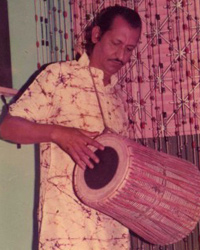 Ansuman Roy ()
Ansuman Roy () 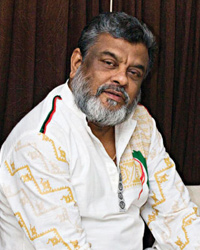 Sujeya Syam (Born 1946) Won 4 National Film Award for his music in the movies 'Hasan Raja', 'Joy Jatra', 'Antar Jatra' and 'Abujh Bau' (for background music). Early career as Hawaiian Guitarist (1964) and instrumentalist (1968) for Pakistani Radio (1964) in Chittagong and Dhaka respectively. During Muktijuddho, joined Swadhin Bangla Betar Kendra in the first week of June 1971 and composed classics like 'Rokto diye naam likhechhi', and 'Bijoy nishan urchhey oi', the last song of SBBK and the first song aired on the Bangladesh Betar after the independence. After independence, he returned back to music production and retired as the principal producer from Bangladesh Betar in 2001. Born in Sylhet.
Sujeya Syam (Born 1946) Won 4 National Film Award for his music in the movies 'Hasan Raja', 'Joy Jatra', 'Antar Jatra' and 'Abujh Bau' (for background music). Early career as Hawaiian Guitarist (1964) and instrumentalist (1968) for Pakistani Radio (1964) in Chittagong and Dhaka respectively. During Muktijuddho, joined Swadhin Bangla Betar Kendra in the first week of June 1971 and composed classics like 'Rokto diye naam likhechhi', and 'Bijoy nishan urchhey oi', the last song of SBBK and the first song aired on the Bangladesh Betar after the independence. After independence, he returned back to music production and retired as the principal producer from Bangladesh Betar in 2001. Born in Sylhet.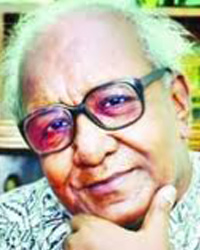 Ajit Roy () Composed several patriotic songs including "Ekti Bangladesh tumi jagroto janatar", "Apomaney tumi shedin jwaley uthechhiley barnomala", "Banglar mukh ami dekiachhi", "Hey bango bhandarey tabo" and more which went on to become hugely popular.
Ajit Roy () Composed several patriotic songs including "Ekti Bangladesh tumi jagroto janatar", "Apomaney tumi shedin jwaley uthechhiley barnomala", "Banglar mukh ami dekiachhi", "Hey bango bhandarey tabo" and more which went on to become hugely popular. Arup Chowdhury ()
Arup Chowdhury () 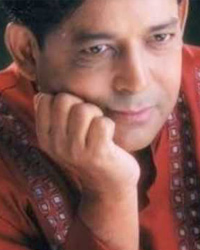 Kaderi Kibria ()
Kaderi Kibria ()  Kalyani Ghosh ()
Kalyani Ghosh ()  M. A. Mannan ()
M. A. Mannan ()  Manna Haque ()
Manna Haque ()  Nawsher ()
Nawsher () 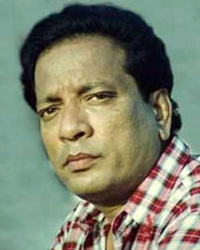 Probal Chowdhury ()
Probal Chowdhury ()  Rafiqul Alam ()
Rafiqul Alam () 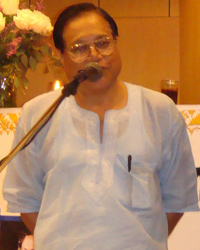 Rothin (Rothindranath) Roy () Sang more than 50 songs during Liberation War, including Chashader muteder majurer, O bhai khati shonar cheye, O bogilarey, Poraner bandhu re, Amar desher shonar dhan, O bhai mor bangalee re, O Biral rui machher matha khaiona, Joy Bangla Boila Re, Amar Neta Tomar Neta. Powerful liberation song 'Teer Hara Ei Dhaoyer Shagor' tuned for him by Apel Mahmood on the first day of his arrival in SBBK in Kolkata, recorded in the evening and aired the next day - song became instant hit.
Rothin (Rothindranath) Roy () Sang more than 50 songs during Liberation War, including Chashader muteder majurer, O bhai khati shonar cheye, O bogilarey, Poraner bandhu re, Amar desher shonar dhan, O bhai mor bangalee re, O Biral rui machher matha khaiona, Joy Bangla Boila Re, Amar Neta Tomar Neta. Powerful liberation song 'Teer Hara Ei Dhaoyer Shagor' tuned for him by Apel Mahmood on the first day of his arrival in SBBK in Kolkata, recorded in the evening and aired the next day - song became instant hit.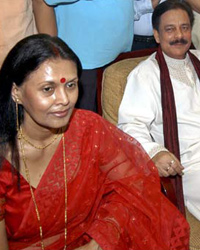 Swapna Roy () Ek Shagore Rakter Binimoye Banglar Swadhinata Anlo Jara, written by Gobindo Haldar and sung by Apel Mahmood and Swapna Roy, was another top favourite which has been duly selected as the signature tune of BTV's National News. Married to Roy Sahara, owner of Indian corporation Sahara.
Swapna Roy () Ek Shagore Rakter Binimoye Banglar Swadhinata Anlo Jara, written by Gobindo Haldar and sung by Apel Mahmood and Swapna Roy, was another top favourite which has been duly selected as the signature tune of BTV's National News. Married to Roy Sahara, owner of Indian corporation Sahara. Hemanta Mukherjee ()
Hemanta Mukherjee ()
The recording machine was a very ordinary compared to the facilities of today. Our only duty was to record the programmes and keep the tapes in a safe place. We were not told from where the songs were transmitted.
The artistes of SBBK used to go to the camps of freedom fighters in the Muktanchal and in the refugee camps to inspire them. Rothin vividly recalls many emotional incidents of that time. A team had come to recruit freedom fighters. A boy who sought membership in the team was adamant about going, against his mother's will. The boy got into the truck while the mother desperately ran after it and pleaded with her son to have his last meal from her. Can you tell me how I can forget that moment?
Rothindranath Roy, famous SBBK singer recalling those highly emotional testing times during Swadhinata Juddho
Songs forgotten
We hardly can remember around 50 songs out of about 200 patriotic songs aired on SBBK these days. Composers of the radio station like Samar Das and Ajit Roy have already died. I’m also not in well condition. I’m concerned about the future of these songs, if those are not preserved till we are alive and active.
I was already telling any artiste I met to join Swadhin Bangla Betar Kendra. Later, Abdul Jabbar came to Agartala. Then came Ashfaqur Rahman Khan, Shahidul Islam, Ashraful Alam and Taher Sultan to Agartala. The station went on air on 25 may 1971, the birthday of rebel poet Kazi Nazrul Islam. Ashfaqur Rahman and others went to Kolkata to join the station. I joined Swadhin Bangla Betar Kendra on 1 June 1971.
Apart from being a singer, I was also one of the coordinators, who sent artistes to the different camps. I used to travel to war fronts and regularly travel to camps of the freedom fighters. I also appeared in some dramas aired by the station. We used to relay satire plays to refute the propaganda of Pakistan radio.
Even though I was in the station, my mind was always in the war fronts. For this, the Pakistanis blacklisted a few of us and our movement got restricted and we could not go out in Kolkata as often.
These days, many in the music industry are doing business with the songs originally aired on Swadhin Bangla Betar Kendra, which is very unfortunate. We were united during those nine months of war. After the war, all our unity was gone.
It is up to the new generation to show the way, to lead the nation, to unite everyone; we went to Liberation War to give the next generation a free country. It is time for the young generation to come forward and lead the nation on the right path.
Apel Mahmood who sang the famous war song 'Mora Ekti Phool Ke Bachabo Boley Juddho Kori'

